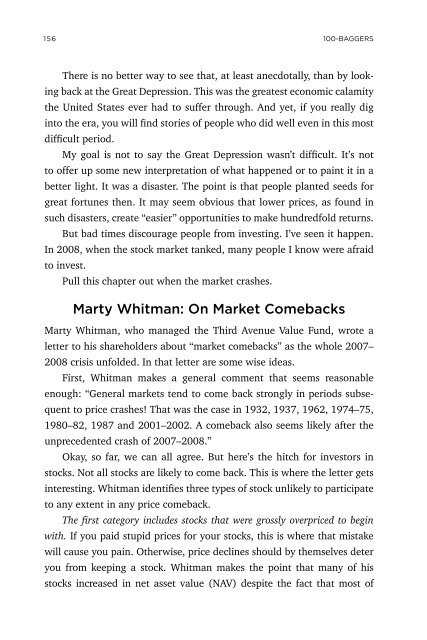Create successful ePaper yourself
Turn your PDF publications into a flip-book with our unique Google optimized e-Paper software.
156<br />
100-BAGGERS<br />
There is no better way to see that, at least anecdotally, than by looking<br />
back at the Great Depression. This was the greatest economic calamity<br />
the United States ever had to suffer through. And yet, if you really dig<br />
into the era, you will find stories of people who did well even in this most<br />
difficult period.<br />
My goal is not to say the Great Depression wasn’t difficult. It’s not<br />
to offer up some new interpretation of what happened or to paint it in a<br />
better light. It was a disaster. The point is that people planted seeds for<br />
great fortunes then. It may seem obvious that lower prices, as found in<br />
such disasters, create “easier” opportunities to make hundredfold returns.<br />
But bad times discourage people from investing. I’ve seen it happen.<br />
In 2008, when the stock market tanked, many people I know were afraid<br />
to invest.<br />
Pull this chapter out when the market crashes.<br />
Marty Whitman: On Market Comebacks<br />
Marty Whitman, who managed the Third Avenue Value Fund, wrote a<br />
letter to his shareholders about “market comebacks” as the whole 2007–<br />
2008 crisis unfolded. In that letter are some wise ideas.<br />
First, Whitman makes a general comment that seems reasonable<br />
enough: “General markets tend to come back strongly in periods subsequent<br />
to price crashes! That was the case in 1932, 1937, 1962, 1974–75,<br />
1980–82, 1987 and 2001–2002. A comeback also seems likely after the<br />
unprecedented crash of 2007–2008.”<br />
Okay, so far, we can all agree. But here’s the hitch for investors in<br />
stocks. Not all stocks are likely to come back. This is where the letter gets<br />
interesting. Whitman identifies three types of stock unlikely to participate<br />
to any extent in any price comeback.<br />
The first category includes stocks that were grossly overpriced to begin<br />
with. If you paid stupid prices for your stocks, this is where that mistake<br />
will cause you pain. Otherwise, price declines should by themselves deter<br />
you from keeping a stock. Whitman makes the point that many of his<br />
stocks increased in net asset value (NAV) despite the fact that most of


